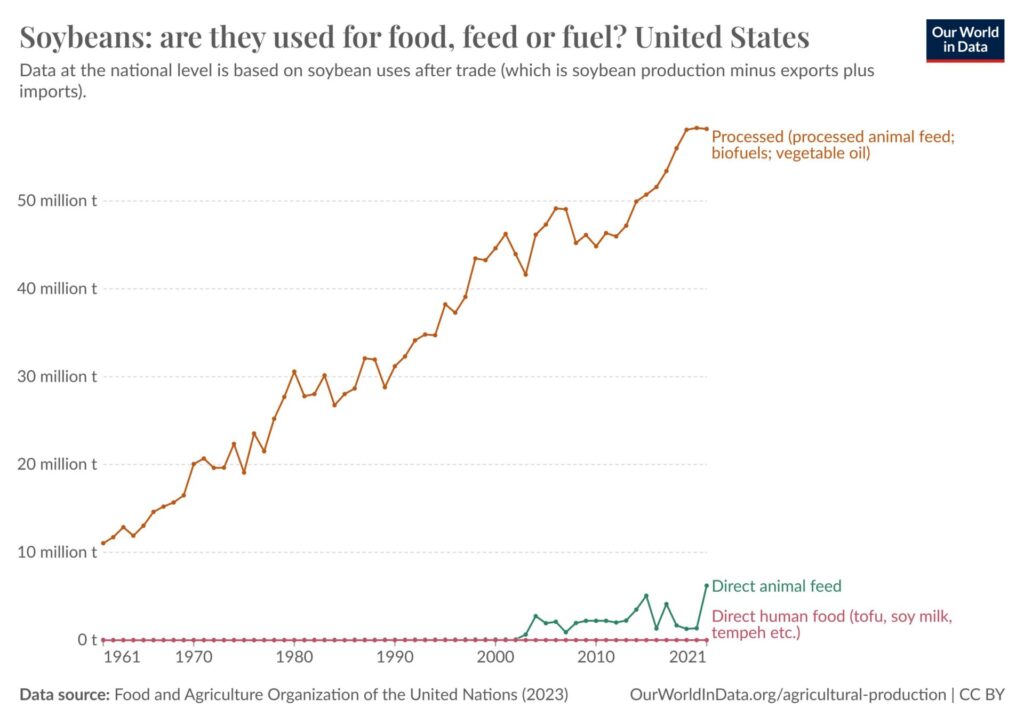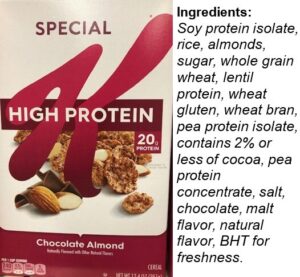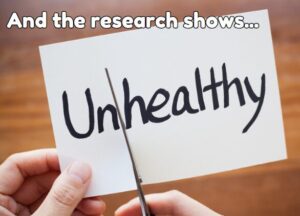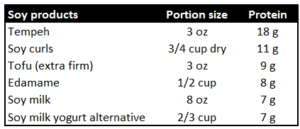 What is your perception of soy?
What is your perception of soy?
Do you embrace it as something that is beneficial for your health?
Or is your perception that it should be avoided due to concerns about breast cancer and thyroid issues?
If you’re confused and have questions, you’re not alone! Due to conflicting information, misperceptions, and varying perspectives on its health effects, it is hard to know what to believe.
We want to try to help clear up the confusion.
What is soy?
 Soy describes the versatile and nutritious plant-based food made from soybeans, which are legumes. You might find it interesting that the vast majority of soybean production is processed into animal feed, biofuel and vegetable oils. Only about 6% of the worldwide soybean production goes into food products for human consumption.
Soy describes the versatile and nutritious plant-based food made from soybeans, which are legumes. You might find it interesting that the vast majority of soybean production is processed into animal feed, biofuel and vegetable oils. Only about 6% of the worldwide soybean production goes into food products for human consumption.
For many soy-based food products, they are a great source of protein, vitamins, and minerals and are found in many forms, including tofu, tempeh, edamame, soy curls, soy milk, soy sauce, miso, and more. They are popular in many Asian cuisines and in many plant-based and vegan diets.
Is soy good or bad for your health?
There has been A LOT of controversy about how soy products affect your health. You might read one article that talks about all the health benefits and the next article will point out all the reasons you should avoid it. Remember, soybeans are legumes and are loaded with protein, fiber and a lot of health-promoting vitamins and minerals. In an ideal world, it would be as simple as that. But as we all know, our world isn’t always that simple.
Here are some key considerations:
 Cancer risk? The research shows that whole soy products are actually protective against many forms of cancer. The controversy you often read about comes from the fact that soy is rich in phytoestrogens, the plant form of human estrogen. This raised concerns about the effects of soy consumption since increased levels of estrogen have been linked to increased risk of breast cancer. Some early studies in lab rats generated all kinds of media attention about soy increasing the risk of certain cancers. However, subsequent studies showed that these phytoestrogens are metabolized very differently in humans.
Cancer risk? The research shows that whole soy products are actually protective against many forms of cancer. The controversy you often read about comes from the fact that soy is rich in phytoestrogens, the plant form of human estrogen. This raised concerns about the effects of soy consumption since increased levels of estrogen have been linked to increased risk of breast cancer. Some early studies in lab rats generated all kinds of media attention about soy increasing the risk of certain cancers. However, subsequent studies showed that these phytoestrogens are metabolized very differently in humans.
To keep it simple, we all have different kinds of estrogen receptors in our bodies. Some promote cell growth and others can act as tumor suppressors. Studies show that the phytoestrogens in soy (called isoflavones) may be more likely to bind to the tumor suppressors. The studies to date do NOT show that soy increases cancer risk.
-
- Some studies have found that higher consumption of certain soy products actually reduce total cancer risk.
- A study focused on Chinese women, where soy consumption is more prevalent, found that moderate soy intake was not associated with higher breast cancer risk and might even provide benefits for the prevention of breast cancer.
- This study focused on North American breast cancer survivors found a higher intake of isoflavone (the phytoestrogen found in soy) was associated with reduced all-cause mortality.
- Bad for your thyroid? Early research, particularly in animals, showed that high doses of soy isoflavones could negatively affect thyroid function. These studies often involved doses much higher than typical human consumption. In part, this relates to how these soy compounds can interfere with the thyroid’s ability to absorb iodine (which is important for thyroid hormone production). The overall impact of soy on thyroid health for most people appears to be minimal, especially when consumed in minimally processed varieties, in moderation, and within a diet that includes sufficient iodine. Anyone with thyroid disorders or concerns should seek appropriate medical guidance.
- Buy organic? It is estimated over 90% of U.S. soybeans are genetically modified (GMO). Most GMO soybeans are engineered to be resistant to glyphosate, a common herbicide. This allows farmers to apply the herbicide to kill weeds without damaging the soy crop. Numerous concerns about glyphosate have arisen including how they negatively impact the gut microbiome and how they can perhaps cause Non-Hodgkins Lymphoma. When buying soy products, it is a good idea to buy organic whenever possible (which eliminates both GMO and glyphosate).
Part of a healthy lifestyle?
Soy offers numerous health benefits, especially for heart health, bone health, and potentially reducing the risk of certain cancers.
 It is a complete protein, providing all the essential amino acids. It is a great protein source for everyone, and especially for vegetarians and vegans.
It is a complete protein, providing all the essential amino acids. It is a great protein source for everyone, and especially for vegetarians and vegans.- It can help lower LDL (bad) cholesterol, which has been shown to reduce the risk of heart disease.
- As discussed above, some research suggests that soy consumption may help lower the risk of certain cancers, such as breast and prostate cancer.
- The high fiber content, especially for edamame, soy curls and tempeh, promote good gut health, digestion and can help “keep things moving.”
- The calcium and isoflavones can support good bone health and reduce the risk of osteoporosis, including in postmenopausal women. It has also been shown to help alleviate hot flashes and other menopausal symptoms.
- It is rich in vitamins and minerals, including B vitamins, iron, calcium, and magnesium.
So many soy products…
To get the biggest nutritional punch, you want to focus on whole soybean foods. In next week’s coaching tip, we will summarize these foods and provide ideas how to enjoy them.
Before we dive into these whole soybean foods, it is worth mentioning a couple of foods that originate from soybeans that aren’t necessarily good for your health:
Soy protein isolate?
 You may also see something called “soy protein isolate” in a lot of pre-packaged foods at the store. You will find it in a lot of protein bars and shakes, cereals, cookies, crackers, dairy alternatives, and plant-based meats, just to name a few.
You may also see something called “soy protein isolate” in a lot of pre-packaged foods at the store. You will find it in a lot of protein bars and shakes, cereals, cookies, crackers, dairy alternatives, and plant-based meats, just to name a few.
To make it, soybeans go through a chemical process to remove the fiber, carbs, fats and other nutrients to create a highly concentrated form of protein. While it is a good source of protein, it does go through a decent amount of processing and is often incorporated into pre-packaged foods with other not-so-great ingredients. Unless it is organic, it likely comes from genetically modified soybeans and may have been exposed to herbicides or pesticides.
Instead of getting your protein from these products, we encourage you to focus on less processed soy products like organic edamame, tempeh or tofu, which also have fiber and other beneficial nutrients. And of course, protein from all the other REAL foods!
Soybean oil?
Soybean oil is also very prevalent in a variety of foods in the grocery store aisles, including salad dressings, mayonnaise, baked good, candy, crackers, and more. It is also frequently used in fast food and other restaurants. Instead of the oil being pressed from the beans (like the process used with extra virgin olive oil), soybean oil is typically refined, meaning chemicals or solvents are used to extract the oil.
This method produces high volumes of oil that have a longer shelf life, higher smoke point, neutral taste and aroma, and are less expensive. However, this process also retains the least amount of nutrients. You will also see soybean oil combined with other refined oils and sold as “vegetable oil.”
Consuming large quantities of highly refined soybean oil does not promote good health. Instead, when using cooking oils, it is better to opt for others like extra virgin olive oil or avocado oil.
 Stay tuned for next week’s coaching tip on the various soy products and what to do with them!
Stay tuned for next week’s coaching tip on the various soy products and what to do with them!
 LEARN MORE ABOUT THE NAPKIN!
LEARN MORE ABOUT THE NAPKIN!



Thanks for the wonderful article.
I recently eat a lot of tofu, then I heard people concerned about breast cancer need to avoid, I just about going to stop eat too much of tofu.
Now, I feel more confident to eat if I want to. I also like the organic sell at dillons.
Thank you so much for the feedback, we miss seeing you!
Are GMO products bad for you?
Gil – Thank you for asking, we know all of the terms (Organic, GMO, “natural”, and more!) can be confusing on what is the best thing to do. I am going to include a link to our “Should You Only Eat Organic?” coaching tip where we address a little bit about GMO’s. Typically GMO’s are prohibited in organic processing, so that is one way to avoid them. If you are going to eat organic, focus on soy, corn and oats, those are the top 3 we recommend buying organic. I hope this helps some – thank you again!